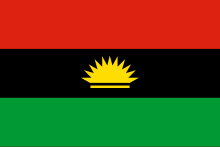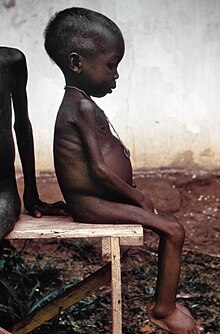Biafra
The Republic of Biafra was a state that declared independence from Nigeria in 1967 under the leadership of the Igbo (obsolete Ibo ) ethnic group . The state comprised the southeastern part of Nigeria including large oil reserves in the Niger Delta and was recognized by four African states and Haiti . In the course of the Biafra War from 1967 to 1970, Biafra was reintegrated into Nigeria. The hunger blockade imposed at the time shaped the image of the Biafra child as a symbol of malnutrition.
history
The name Biafra can be traced back to the 16th century as the region name "Biafar" on historical seafarers' maps. Since 1972, Nigeria has renamed the "Bay of Biafra" to " Bay of Bonny " in order to eradicate the name Biafra after the Biafra War.
"Military coup" and counter-coup in 1966
On January 15, 1966, Nigerian Prime Minister Abubakar Tafawa Balewa was killed in a coup by young officers, most of whom belonged to the Igbo people, who were mostly Roman Catholic . In May 1966 the putschists passed a constitutional amendment. Shortly thereafter, however, there was a counter-coup: On July 29, 1966, the leader of the military government , Johnson Aguiyi-Ironsi , was deposed and executed.
The Igbo were mainly native to the then Eastern Region ( Eastern Region ) of Nigeria, which at that time had 14 million inhabitants (with a total population of 55 to 60 million in Nigeria at that time). About 2.5 million Igbo lived in other parts of the country. In the course of the counter-coup in the north of Nigeria, the local Muslim ethnic groups of the Hausa and Fulani led to pogroms against the Igbo, in which around 30,000 were killed by October 1966. 2 million Igbo fled to the eastern region.
Declaration of Independence and War 1967–1970
Against this background, Chukwuemeka Odumegwu Ojukwu , the military governor of the eastern region of Nigeria and Igbo himself, declared this part of the country to be independent on May 30, 1967. He derived the country name of the new republic from the Bay of Biafra , part of the Gulf of Guinea . The capital of Biafras was Enugu , and after its conquest the seat of administration and government was moved to Umuahia and finally to Owerri . The chorale part of the Finlandia by Jean Sibelius with the flag-related title Land of the Rising Sun was chosen as the national anthem . The country had its own currency, the Biafra pound .
While the Igbo generally welcomed the declaration of independence, it was rather rejected by smaller ethnic groups in the eastern region, especially in the Niger Delta, as they feared they would be marginalized and oppressed in an Igbo-dominated state.
Only Tanzania , Gabon , Zaire , Ivory Coast and - as the only non-African country - Haiti recognized Biafra as an independent state.
On July 6, 1967, the first attack by Nigerian troops took place when they crossed the Niger River near the city of Asaba and invaded Biafra. With that the Biafra War began . The clashes lasted for around 30 months and ended in January 1970 with Biafra's surrender. At least a million people - some estimated two million or more - perished in the war. Measures by the Nigerian side, such as the imposition of a blockade on Biafra, which led to widespread hunger among the civilian population, as well as various attacks against Igbo civilians, together with the massacres of 1966, are sometimes classified as genocide against the Igbo. The Republic of Biafra existed until January 15, 1970 and was finally reintegrated into Nigeria after the war.
Biafra today
The area claimed by Biafra, the former eastern region, is now divided into the states of Abia , Akwa Ibom , Anambra , Bayelsa , Edo , Cross River , Ebonyi , Enugu , Delta , Imo and Rivers .
Radio Biafra London , the Bilie Human Right Organization and the Council of Indigenous People of Biafra are committed to the restoration of the state. Furthermore, the militant underground organization Movement for the Actualization of the Sovereign State of Biafra (MASSOB, Movement for the Realization of a Sovereign State of Biafra) is fighting for the independence of Biafra.
Continue
The humanitarian catastrophe in Biafra was the reason for the establishment of Doctors Without Borders .
Literary processing of the Biafra war
More than a hundred novels and short stories have been published by Nigerian authors on the subject of the Biafra War since 1970. A selection:
- Chimamanda Ngozi Adichie : Half the Sun. Luchterhand, 2007. A novel against the backdrop of the Biafra War.
- Wole Soyinka : The man is dead. Jail records. 1987. Autobiographical novel about his imprisonment for his work for a peaceful solution to the Biafra War.
- Chinua Achebe : Civil Peace. 1971. Short story about the effects of the Biafra War.
- Buchi Emecheta : Destination Biafra. London 1981
- Ken Saro-Wiwa : Sozaboy. 1979. Anti-war novel. A young African in the civil war; full of naive zest for life and energy, he reports as a soldier and is overwhelmed by the confusing and terrible reality of war.
Non-fiction
- Frederick Forsyth : Biafra Story. Report on an African tragedy . Translated from the English by Ulrike Puttkamer. Piper, Munich 1976, ISBN 3-492-02244-8 .
- Tilman Zülch : Biafra. Death sentence for a people? Lettner, Berlin 1969
- Republic of Biafra (Ed.): Introducing the Republic of Biafra . Government of the Republic of Biafra, Enugu 1967 ( online )
- Marion Pape: Women write war. The literary processing of the Nigerian civil war (PDF; 1.0 MB), (Diss.) Berlin 2006
- Christian Heidrich: Carlo Bayer. A Roman from Silesia and a pioneer of Caritas Internationalis. Thorbecke, Sigmaringen 1992, in particular pp. 237-316.




